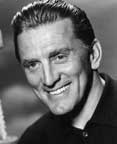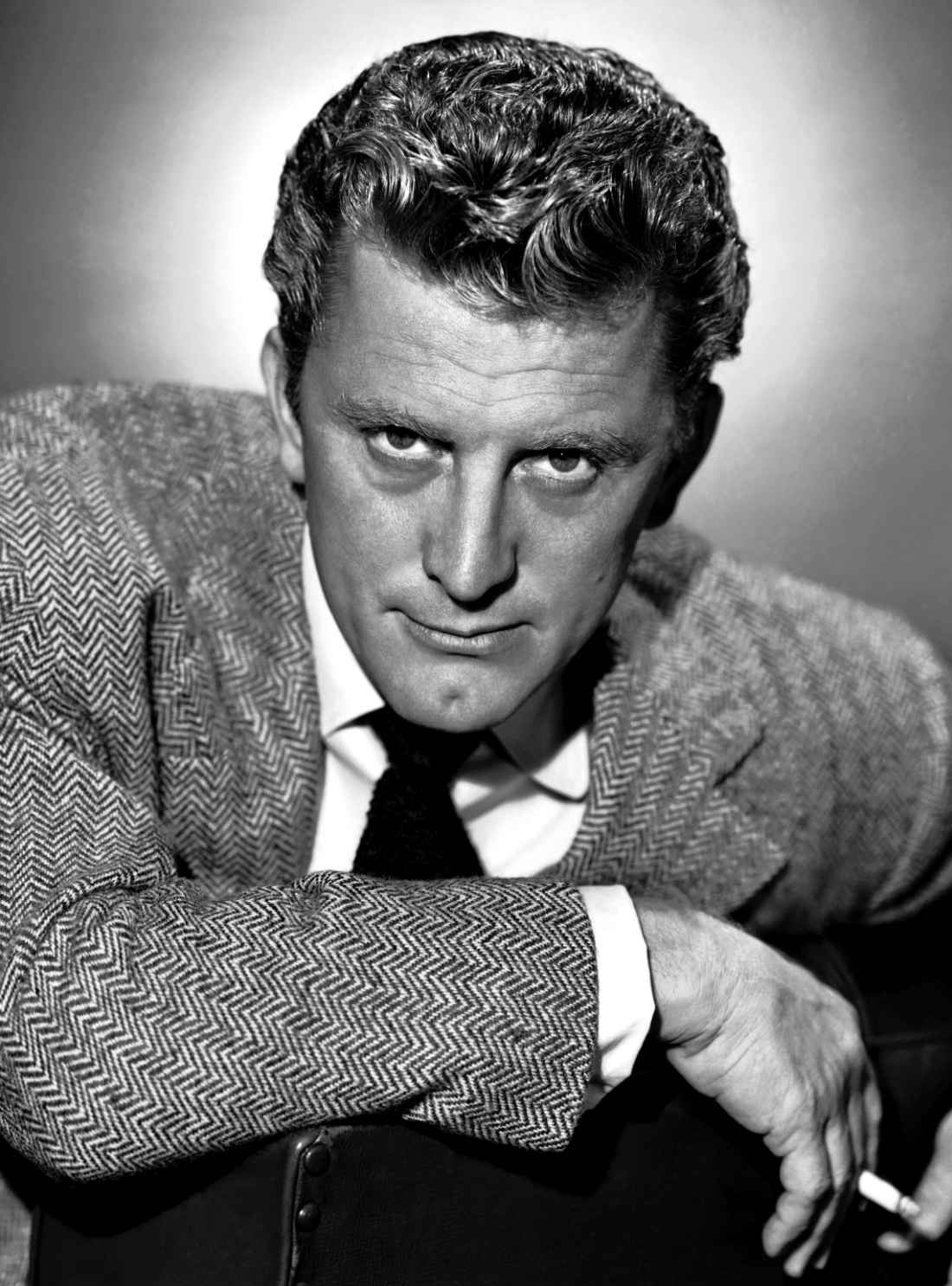Kirk Douglas
(1916 - 2020 )

 |
Kirk Douglas was born on December 9, 1916, as Issur Danielovitch Demsky in Amsterdam, New York. His parents, Herschel Danielovitch and Bryna Sanglel were poor Belarusian Jews, originally from Homel. In his 1988 autobiography, The Ragman’s Son, Douglas relatedthe hardships that he, along with six sisters and his parents, endured during their early years in Amsterdam, New York:
Growing up, Douglas sold snacks to mill workers to earn enough to buy milk and bread to help his family. Later, he delivered newspapers and during his youth he had more than forty jobs before becoming an actor. He found living in a family with six sisters to be stifling: “I was dying to get out. In a sense, it lit a fire under me.”
After appearing in plays at Amsterdam High School, from which he was graduated in 1934, he knew he wanted to become a professional actor. Unable to afford the tuition, Douglas talked his way into the dean’s office at St. Lawrence University. He received a loan which he paid back by working part-time as a gardener and a janitor. He was a standout on the wrestling team and wrestled one summer in a carnival to make money. He graduated with a bachelor’s degree in 1939.
Douglas was first noticed as an actor at the American Academy of Dramatic Arts in New York City, where he obtained an acting scholarship.
Before he could begin his career, World War II intervened. From 1941 to 1945, Douglas served in the U.S. Navy as a communications officer in anti-submarine warfare. He was medically discharged in 1944 for war injuries sustained from the accidental dropping of a depth charge.
Following the war, Douglas returned to New York and began doing commercials and radio theatre. His stage break occurred when he took over the role played by Richard Widmark in Kiss and Tell (1943), which then led to other offers.
Douglas’ first screen role came in 1946, in the Hal B. Wallis movie, The Strange Love of Martha Ivers. Douglas’s image as a tough guy was established in his eighth film, Champion (1949), after producer Stanley Kramer chose him to play a selfish boxer. In accepting the role, he took a gamble, however, since he had to turn down an offer to star in a big-budget MGM film, The Great Sinner, which would have earned him three times the income.
Throughout the 1950s and 1960s, Douglas was a major box-office star, playing opposite some of the leading actresses of that era. He also became a star of westerns, often playing a gunslinger. His favorite was Lonely Are the Brave (1962), in which he played a cowboy trying to live by his own code.
In 1955, Douglas began his own production company, Bryna Productions, named after his mother. In 1960, Douglas played the title role in what many consider his career defining appearance in the title role as the Thracian slave rebel in Spartacus (1960). He was the executive producer as well, which raised the $12 million production cost and made it one of the most expensive films up to that time. When the film was released, Douglas gave full credit to its screenwriter, Dalton Trumbo, who was on the Hollywood blacklist. He said, “I’ve made over 85 pictures, but the thing I’m most proud of is breaking the blacklist.” The film’s producer, Edward Lewis, and the family of Dalton Trumbo publicly disputed Douglas’s claim.
Between 1970 and 2008, Douglas made nearly 40 movies and appeared on various television shows. In 1988, Douglas starred in a television adaptation of Inherit the Wind, opposite Jason Robards and Jean Simmons. The film won two Emmy Awards.
In 1996, Kirk Douglas suffered a stroke, which partly impaired his speech ability. He underwent years of voice therapy and made Diamonds in 1999, in which he played an old prizefighter who was recovering from a stroke.
In 2003, Michael and Joel Douglas produced It Runs in the Family, which along with Kirk starred various family members, including Michael, Michael’s son, and his wife from 50 years earlier, Diana Dill, playing his wife. His final feature-film appearance was in the 2004 Michael Goorjian film Illusion, in which he depicts a dying film director forced to watch episodes from the life of a son he had refused to acknowledge. His last screen role was the TV movie Empire State Building Murders, which was released in 2008.
In March 2009, Douglas did an autobiographical one-man show, Before I Forget, at the Center Theatre Group’s Kirk Douglas Theatre in Culver City, California. The four performances were filmed and turned into a documentary.
Douglas stated that the keys to acting success are determination and application: “You must know how to function and how to maintain yourself, and you must have a love of what you do. But an actor also needs great good luck. I have had that luck.”
Douglas received three Academy Award nominations for his roles in Champion, The Bad and the Beautiful, and Lust for Life. In 1996, Douglas was awarded a special Oscar for 50 years as a moral and creative force in the motion picture community.
For Douglas movies were about art and entertaiment. “To me it is the most important art form—it is an art, and it includes all the elements of the modern age” and, he said, “You can make a statement, you can say something, but it must be entertaining.”
Douglas was married twice, first to Diana Dill on November 2, 1943. Dill and Douglas had two sons, actor Michael Douglas and producer Joel Douglas, before divorcing in 1951. Douglas married his second wife, Anne Buydens on May 29, 1954, and had two sons, producer Peter Vincent Douglas and actor Eric Douglas (who died on July 6, 2004, of a drug overdose).
In February 1991, Douglas was in a helicopter and was injured when the aircraft collided with a small plane above Santa Paula Airport. Two other people were also injured; two people in the plane were killed. This near-death experience sparked a search for meaning by Douglas, which led him, after much study, to embrace the Judaism in which he had been raised. He documented this spiritual journey in his book, Climbing the Mountain: My Search for Meaning (1997).
In an interview in 2000, he said:
Unknown to much of the public, Douglas dedicated his life to humanitarian efforts. Beginning in 1963, he was a Goodwill Ambassador for the U.S. State Department. For all his goodwill efforts, he received the Presidential Medal of Freedom from President Jimmy Carter in 1981.
Douglas died on February 5, 2020, at his home in Beverly Hills at the age of 103.
Sample of other Honors:
Cecil B. DeMille Award for Lifetime Achievement (1968)
Star on the Hollywood Walk of Fame
Presidential Medal of Freedom (1981)
Jefferson Award (1983)
Western Performers Hall of Fame (1984)
French Legion of Honor (1985)
American Cinema Award (1987)
German Golden Kamera Award (1987)
The National Board of Reviews Career Achievement Award (1989)
AFI Life Achievement Award (1991)
Kennedy Center Honors (1994)
Honorary Academy Award (1995)
Recipient of the American Film Institute’s Lifetime Achievement Award (1999)
National Medal of Arts (2002)
UCLA Medal of Honor (2002)
Books
The Ragman’s Son. Simon & Schuster, 1988. ISBN 0-671-63717-7.
Dance with the Devil. Random House, 1990. ISBN 0-394-58237-3.
The Gift. Grand Central Publishing, 1992. ISBN 0-446-51694-5.
Last Tango in Brooklyn. Century, 1994. ISBN 0-7126-4852-6.
The Broken Mirror: A Novella. Simon & Schuster Books for Young Readers, 1997. ISBN 0-689-81493-3.
Young Heroes of the Bible. Simon & Schuster Books for Young Readers, 1999. ISBN 0-689-81491-7.
Climbing the Mountain: My Search for Meaning. Simon and Schuster, 2001. ISBN 0-7432-1438-2.
My Stroke of Luck. HarperCollins, 2003. ISBN 0-06-001404-0.
Let’s Face It: 90 Years of Living, Loving, and Learning. John Wiley & Sons, 2007. ISBN 0-470-08469-3.
I Am Spartacus!: Making a Film, Breaking the Blacklist. Open Road Media, 2012. ISBN 1-4532-3937-5.
Life Could Be Verse: Reflections on Love, Loss, and What Really Matters. Health Communications, Inc., 2014. ISBN 978-0-7573-1847-4
Sources: Wikipedia, Internet Movie Database.
Photo: Public Domain


